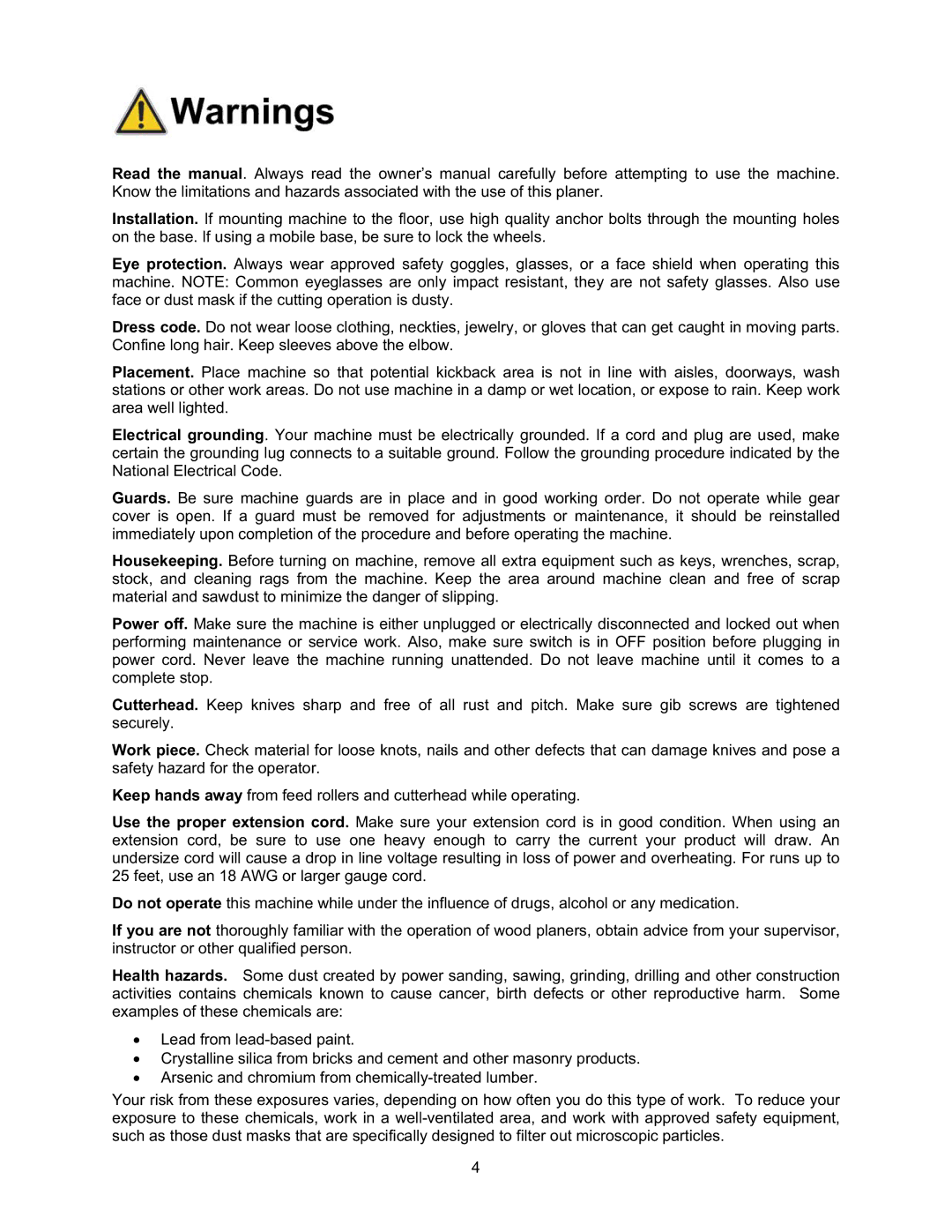
Read the manual. Always read the owner’s manual carefully before attempting to use the machine. Know the limitations and hazards associated with the use of this planer.
Installation. If mounting machine to the floor, use high quality anchor bolts through the mounting holes on the base. If using a mobile base, be sure to lock the wheels.
Eye protection. Always wear approved safety goggles, glasses, or a face shield when operating this machine. NOTE: Common eyeglasses are only impact resistant, they are not safety glasses. Also use face or dust mask if the cutting operation is dusty.
Dress code. Do not wear loose clothing, neckties, jewelry, or gloves that can get caught in moving parts. Confine long hair. Keep sleeves above the elbow.
Placement. Place machine so that potential kickback area is not in line with aisles, doorways, wash stations or other work areas. Do not use machine in a damp or wet location, or expose to rain. Keep work area well lighted.
Electrical grounding. Your machine must be electrically grounded. If a cord and plug are used, make certain the grounding lug connects to a suitable ground. Follow the grounding procedure indicated by the National Electrical Code.
Guards. Be sure machine guards are in place and in good working order. Do not operate while gear cover is open. If a guard must be removed for adjustments or maintenance, it should be reinstalled immediately upon completion of the procedure and before operating the machine.
Housekeeping. Before turning on machine, remove all extra equipment such as keys, wrenches, scrap, stock, and cleaning rags from the machine. Keep the area around machine clean and free of scrap material and sawdust to minimize the danger of slipping.
Power off. Make sure the machine is either unplugged or electrically disconnected and locked out when performing maintenance or service work. Also, make sure switch is in OFF position before plugging in power cord. Never leave the machine running unattended. Do not leave machine until it comes to a complete stop.
Cutterhead. Keep knives sharp and free of all rust and pitch. Make sure gib screws are tightened securely.
Work piece. Check material for loose knots, nails and other defects that can damage knives and pose a safety hazard for the operator.
Keep hands away from feed rollers and cutterhead while operating.
Use the proper extension cord. Make sure your extension cord is in good condition. When using an extension cord, be sure to use one heavy enough to carry the current your product will draw. An undersize cord will cause a drop in line voltage resulting in loss of power and overheating. For runs up to 25 feet, use an 18 AWG or larger gauge cord.
Do not operate this machine while under the influence of drugs, alcohol or any medication.
If you are not thoroughly familiar with the operation of wood planers, obtain advice from your supervisor, instructor or other qualified person.
Health hazards. Some dust created by power sanding, sawing, grinding, drilling and other construction activities contains chemicals known to cause cancer, birth defects or other reproductive harm. Some examples of these chemicals are:
ξLead from
ξCrystalline silica from bricks and cement and other masonry products.
ξArsenic and chromium from
Your risk from these exposures varies, depending on how often you do this type of work. To reduce your exposure to these chemicals, work in a
4
